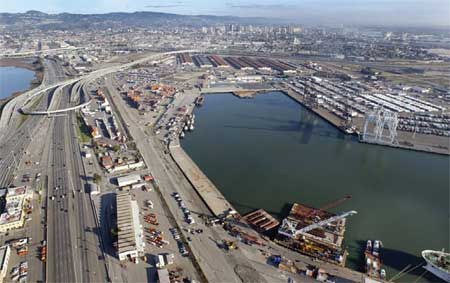By John Rogers
It’s a major blow to what Utah coal producers thought could be a lucrative gateway to Asia for sales of their product.
The city of Oakland, California, has formally put a stop to a project that would have rebuilt the decommissioned Oakland Army Base on San Francisco Bay into the Oakland Bulk and Oversized Terminal (OBOT). Utah’s coal-producing counties — Carbon, Emery, Sanpete and Sevier — had hoped to become investors in the project in exchange for half of the 10-million-ton annual throughput capacity to enable shipping of coal sent to the coast by rail.{mprestriction ids="1,3"}
Port developer Phil Tagami was notified last month of Oakland city leaders’ intention to terminate the project based on failure to meet construction deadlines specified in the lease agreement between Tagami and the city. The default notice said Tagami must now pay the city $1.6 million in project liquidated damages as specified in the 66-year lease.
Tagami isn’t going down without a fight, however. In a 50-page response, he blamed the city for the delays in construction and threatened a lawsuit because of Oakland’s efforts to “sabotage the project.”
Originally a popular anchor for Oakland’s redevelopment project for the old army base, the OBOT ran afoul of politicians when Tagami began negotiating with the Utah counties to make the port primarily coal-exporting. Oakland city leaders voted last year to ban coal transit through the city after learning of Tagami’s deal with Utah coal companies and counties to ship their product overseas. Tagami sued and the battle landed in federal court. In May, U.S. District Judge Vince Chhabria struck down the city’s coal ban, a decision the city is appealing.
A coalition of coal companies and the four counties where coal is mined in Utah had sought to borrow $53 million from the Utah Community Impact Board to invest in the $250 million terminal in order to assure access to a significant portion of the port’s capacity. Now that loan process seems to be moot.
Oakland officials claim the cancellation of the project had nothing to do with coal. City Attorney Barbara Parker said in a written statement, “This isn’t about coal. This is about the developer’s failure to meet its obligations and perform the work it agreed to do. OBOT had years to move this project forward and has used every excuse in the book to justify its failure to perform. This terminal is a critical project that will be an economic engine for West Oakland, our entire city and the region. The city must move this project forward with partners who are able to get the job done.”
Even though Oakland will now seek a new developer for the proposed port, Utah’s coal industry feels that any new lease agreement will specifically ban coal as a product that can transported through the city for shipping from OBOT.{/mprestriction}








